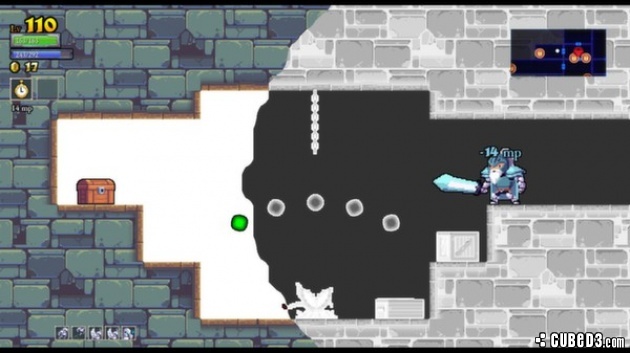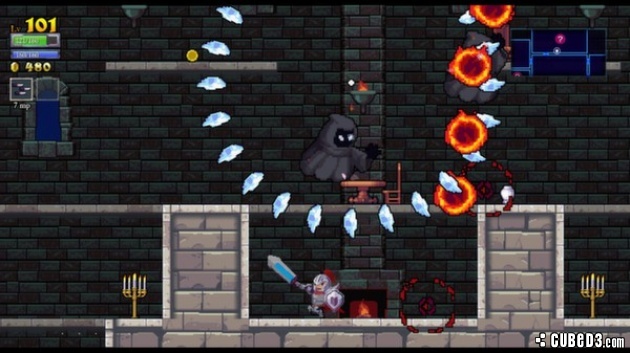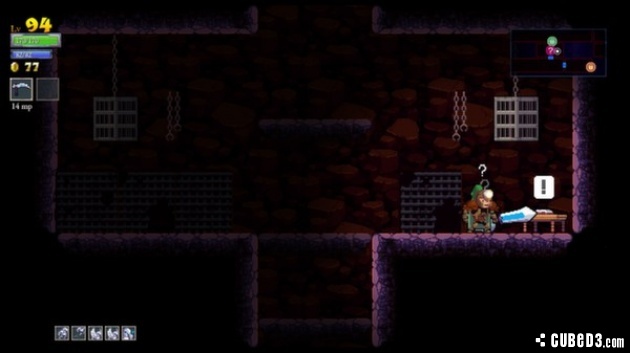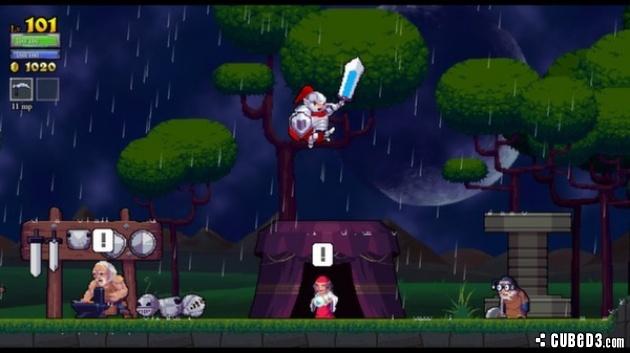Rogue Legacy (PC) Review
By Jordan Hurst  09.09.2014
09.09.2014

Rogue Legacy feels like it was scientifically designed to appeal to the exact tastes of the indie community. It seamlessly combines a roguelike and a Metroidvania (two of gaming's most consistently excellent genres), and seals the package with satisfying combat, balanced role-playing, and a sense of humour. All it needed was 16-bit-era graphics and sound, and a narrative tied into its gameplay mechanics, and it would have been an instant classic. Oh, wait...it does have those.
There is no one thing that makes Rogue Legacy worth playing. Aside from some technical problems and nitpicks, everything it does, it does right. For starters, its genre combination is an unthinkable experiment, with one half based around randomly-generated environments, and the other focused on persistent, connected worlds. However, despite this, by joining the two at their one common element - exploration - and supplementing them with deep overarching RPG mechanics, developer Cellar Door Games has created something smart, charming, and compulsively playable.
In Rogue Legacy, the player's task is to guide the descendants of a legendary swordsman through a mysterious castle in search of an unknown goal behind the throne room doors. Note that "descendants" here refers to an entire family tree's worth. Every time a character dies, their child succeeds them, and, true to its inspirations, Rogue Legacy is hard, so characters will die a lot - it's nearly impossible to beat the game without sacrificing more than a hundred generations over the course of millennia. Every time a new child enters the castle, it's rebuilt with a randomly-generated, non-linear layout, but the previous hero's upgrades and equipment remain. As such, each child is slightly stronger than its predecessor, and can thus venture deeper into the castle, neatly allowing for Metroidvania-style advancement without the need for specifically-placed power-ups and level designs.

Rogue Legacy hews closer to its forefathers than most of its peers of similar genre do. In addition to the gameplay feeling like a more family-friendly Symphony of the Night, many of the spells and enemy designs are ripped directly out of Castlevania; inexplicable roasted chicken is the standard healing item, and it would be astonishing if the hero's descendants weren't nicknamed the Belmonts during development. Heck, Rogue is half the title - clearly, subtlety is not Cellar Door Games' strong suit. Despite its structural and allusive constraints, though, Rogue Legacy still finds room to innovate and surprise.
The "successor" mechanic, in addition to being an audaciously simple justification for player respawning, offers one of the most hilarious and ingenious variations on RPG systems ever seen: each new child comes with a set of medical conditions that make the standard RPG status effects look like common colds. These range from benign conditions like baldness and coprolalia (obsessive swearing), to ridiculous ailments like vertigo, which flips the screen upside-down, and a fear of chicken, which turns healing items into hostile enemies. Character classes get some neat twists of their own, too: liches gain maximum health with every kill, making them enormously useful provided they survive the first few minutes, while spellthieves specialise in spamming magic drained from enemies through physical attacks.
These are just a handful of the dozens of things that Rogue Legacy does to give it the kind of personality needed for a memorable game. Like The Binding of Isaac, Rogue Legacy has embraced the "random" part of the roguelike definition, not just as a technical necessity, but as a mission statement. Clowns offer mini-games, journal entries from a past castle explorer muse on the strangeness of videogame logic, and giant paintings will describe Cellar Door Games' history...if they don't come alive and try to murder the player, that is. The inclusion of the gold-boosting miner class is representative of the game's biggest achievement: not only does it make level-grinding a core gameplay mechanic, but through sheer variety, it also makes it fun.

The game's biggest flaws, on the other hand, are technical. The hit-boxes aren't all that precise, particularly when it comes to larger sprites and attack animations, and enemy projectiles have an annoying habit of tunneling through walls 50% of the time, creating rooms that are much more difficult than they were designed to be. Player movement and overall gameplay is also much faster than what is expected of a Metroidvania, which can make the controls feel slippery at first, but this is alleviated after the first hour or so. Finally, the player's combat arsenal includes a "down attack," which has such pathetically short range and weak damage output that it's a complete write-off in combat, and leads to the most frustrating parts of the game, where the player is expected to use it to activate platforms over spike pits.
Fortunately, the rest of the game's challenge level is more calculated and sensible. It's still fiendishly difficult at times, but in a way that complements its structure. The high difficulty adds a small layer of fear to the gameplay, amplifying the engagement of both the combat and exploration significantly. Meanwhile, the knowledge that even deaths will make a difference in the long run alleviates any frustration they would have otherwise caused. It's the rare kind of game that can be played both casually and religiously, and still be enjoyed. Of course, playing it casually will make for a long series of player murders, but it will be an entertaining series of player murders, which is more than could be said for Dark Souls and many other challenge-focused games.

Impressively, for a roguelike - especially one with such role-playing depth and randomness - Rogue Legacy is quite balanced. Certain classes and runes (which attach to equipment for added movement and combat abilities) are definitely better most of the time, but everything has a specialty that needs to be taken advantage of at some point. The game can still get somewhat repetitive, particularly once at the last area, where the enemy designs run out of steam and are replaced with large palette swaps with grossly overpowered abilities. However, it's worth noting that it's still probably the least repetitive roguelike out there, thanks to its constant character-swapping and unexpected personal touches.
These personal touches even extend to the aesthetics. Like everything the game does, art and music in Rogue Legacy are an evolved homage to classic games, so while the graphics appear to be straightforward, even bare-bones reiterations of GBA Castlevania games, they are livened up with background jokes and neat visual effects for character traits. The audio is also equal parts memorable, atmospheric, and nostalgic, although both the tunes and the player's jangling armour become repetitive in direct proportion to the gameplay repetition. The game even goes above and beyond what is expected of its story; while the plot itself is virtually nonexistent for most of the game, there are a couple of twists connected to the game's structural mechanics that tie the experience together into a cohesive whole. It's no mind-blowing philosophical epiphany, but it elevates the whole scenario beyond a standard self-serving videogame narrative.

Cubed3 Rating
Great - Silver Award

Perhaps it's because its narrative-gameplay integration pushes it above being a good game and into Game of the Year candidacy, or simply because it lets players hunt monsters using a dyslexic knight with dwarfism. Regardless, Rogue Legacy is a must-play. While it may appear to be just another nostalgia-driven paycheque generator on the surface, its wonderfully original structure and genre combination make its largely imitative gameplay feel fresh and exciting. It touches on so many moods and gameplay elements - fear, humour, challenge, exploration, depth - and executes them so well, that it will almost certainly appeal to anyone, regardless of their familiarity with its roots. For those that are familiar with its roots, there's only one thing that needs to be said: Rogue Legacy is a roguelike crossed with a Metroidvania... What else could anyone want?

![]() 8/10
8/10
![]() 0
(0 Votes)
0
(0 Votes)
 Out now
Out now  Out now
Out now  None
None  Out now
Out now Comments
Comments are currently disabled

 Sign In
Sign In Game Details
Game Details Subscribe to this topic
Subscribe to this topic Features
Features





 Top
Top

